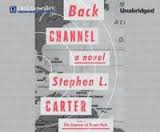Author Stephen L. Carter should be happy about the recent thaw in Cuban-American relations because his latest novel, Back Channel, a political-espionage thriller, revisits the 1962 Cold War Cuban Missile Crisis. 
The novel’s title and premise is based on the fact that during the crisis there was a secret, or back channel of communication between the Soviet Union and the U.S. In Carter’s version, the U.S. go-between is Margo Jensen, a black student at Cornell University. Her Soviet counterpart is Aleksandr Fomin, a KGB agent based in DC, whose real name was Alexander Feksilov. The actual U.S. negotiator was John Scali of ABC News.
What worked well in the story was high level intrigue among JFK’s White House, the Pentagon and CIA. The character list included historical figures such as the Kennedy’s, McGeorge Bundy, Robert McNamara, General Curtis LeMay, Bobby Fisher–the chess prodigy–plus an assortment of U.S. and Soviet spies. Carter’s use of conversation and internal dialogue evoked high tension and made these strategic meetings sound realistic. This material also seemed well researched. And indeed, Carter tells us that declassified government documents were among his research sources.
Stephen Carter has a gift for writing vivid scenes and for creating inspiring and inspired black characters, but in this book, that conceit worked less well when he chose Margo Jensen — a sheltered though bright and ambitious nineteen year-old black college student — to negotiate the world’s fate. I knew that demographic well, because in 1962 I was an eighteen year-old black college student, also attending college in New York. Perhaps because the subject matter was so potentially catastrophic, I had a hard time suspending my disbelief that one of my teenage compadres had the chops to save us from a nuclear holocaust.
Despite my skepticism, the book was entertaining, intelligent and suspenseful. One section that takes place in the dark decaying back alleys of Bulgaria was especially effective, but the introduction of a deux ex machina device made the resolution of that situation also less than convincing.
Finally, though not perfect, reading Back Channel is a creative way to better understand some of the back story of why the U.S. and Cuba have been long time adversaries.
